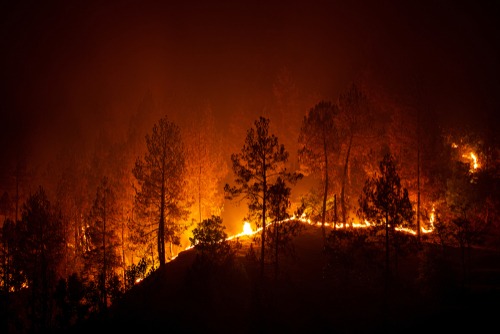
The $1.2 trillion Infrastructure Investment and Jobs Act passed Friday night by the U.S. House of Representatives contained a number of provisions to help the country’s fire and emergency services, including funding for wildfire response and mitigation.
Wildfire provisions in the package included nearly $3.4 billion for wildland fire risk reduction, which would provide funding for the U.S. Department of the Interior and U.S. Forest Service initiatives like mechanical thinning, controlled burns, the Collaborative Forest Restoration Program, and firefighting resources. The package also included $100 million per year for five years for Forest Service Community Defense Grants; $40 million per year for five years for State and Private Forestry grants; and $4 million per year for five years for Volunteer Fire Assistance grants.
Additionally, the bill contained the text of the Wildland Fire Mitigation & Management Commission Act of 2021 establishing a commission to study wildland fire prevention, mitigation, suppression, management, and rehabilitation; converting no fewer than 1,000 seasonal wildland firefighters to full-time, permanent year-round federal employees; and increasing the base salary for a federal wildland firefighter by $20,000 or 50 percent, whichever is lower.
Also included in the package was the authorization of the Assistance for Local Emergency Response Training (ALERT) grant program would allow the International Fire Chiefs Association and other non-profit organizations to use grant money for hazmat response training. Administered by the U.S. Department of Transportation’s Pipeline and Hazardous Materials Safety Administration, the training covers hazmat response training for emergency response to incidents involving the transportation of crude oil, ethanol, and other flammable liquids by rail.
The bill also included $1 billion for State, Local, Tribal and Territorial grants for cyber security, and $5 billion over five years to support activities to reduce the likelihood and consequences of impacts to the electric grid due to extreme weather, wildfire, and natural disaster, as well as $1 billion for the Federal Emergency Management Agency’s Resilient Infrastructure and Communities program.




